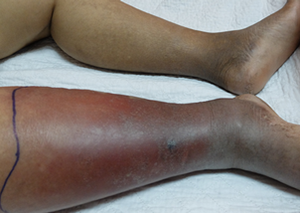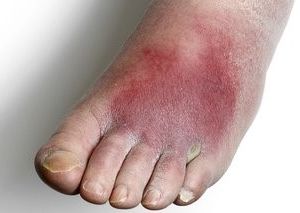Cellulitis
Cellulitis is an infection of the deeper layers of skin. Most cases can be treated with antibiotics at home, although sometimes it needs to be treated in hospital. It can be serious if not treated quickly. It can occur at any age.
Symptoms of cellulitis
Cellulitis causes an area of skin to suddenly become:
- Red
- Hot
- Swollen
- Painful
- Tender
There may also be a break in the skin, although this is not always obvious, and pus or blood-filled blisters. Your child can also have swollen painful glands.



Any part of the body can be affected. The commonly affected areas include lower legs, feet, arms, or hands, and sometimes the face particularly around the eyes. See your GP or visit your nearest minor injuries unit as soon as possible if an area of your skin turns red, painful, or hot.
Additional symptoms
Cellulitis can also cause extra symptoms that may develop before or alongside the changes to your skin.
These can include:
- Feeling generally unwell
- Feeling sick
- Shivering
- Chills
Occasionally the infection can spread to other parts of the body such as deep layers of tissue, blood, muscle and bone. It is important to get help quickly if you are worried.
When should you worry?
If your child has any of the following:
- Orbital (of the eye) cellulitis
- Painful or restricted eye movement
- Unable to see properly
- Eye bulging or severe headache
- A temperature less than 36oC or temperature 38oC or more if baby is less than 3 months
- Breathing very fast or breathing that stops or pauses
- Working hard to breathe, drawing in of the muscles below the rib, unable to talk or noisy breathing (grunting)
- Becomes pale, blue, mottled and/or unusually cold to touch
- Difficult to wake up, very sleepy or confused
- Weak, high-pitched, continuous cry or extremely agitated
- Has a fit (seizure)
- Develops a rash that does not disappear with pressure and seems unwell (see the 'Glass Test')
You need urgent help.
Go to the nearest Hospital Emergency (A&E) Department or phone 999
If your child has any of the following:
- Face or the area around the eye is affected
- Increasing pain or tenderness
- Worsening/spreading red area
- A temperature 39oC or above in babies 3-6 months
- Temperature of 38oC or above for more than 5 days or shivering with fever (rigors)
- Breathing a bit faster than normal or working a bit harder to breathe
- Swelling of a limb or joint
- Too painful for your child to stand
- Complaining of severe pain that is not improving with painkillers
- Dry skin, lips, tongue or looking pale
- Not had a wee or wet nappy in last 12 hours
- Sleepy or not responding normally
- Crying and unsettled
- Poor feeding (babies) or not drinking (children)
- Getting worse or you are worried about them
You need to contact a doctor or nurse today.
Please ring your GP surgery or call NHS 111 - dial 111
If none of the above features are present
Watch them closely for any change and look out for any red or amber symptoms
Additional advice is also available for families for help cope with crying in otherwise well babies
Self care
Continue providing your child’s care at home. If you are still concerned about your child, call NHS 111 – dial 111
Causes of cellulitis
The bacteria that cause it often live harmlessly on the skin, but they can lead to an infection if they get into a break in your skin, such as:
- A bruise, cut or graze
- An animal bite or insect bite
- A leg ulcer
- Dry, cracked skin – for example, because of eczema or athlete's foot
In most cases the trigger for the infection is unknown.
The infection isn't normally spread from person to person.
Treatment
Cellulitis is usually treated with antibiotics at home. Most children will make a full recovery.
Your child will usually be given a course of treatment, and symptoms should start to improve after a few days.
Make sure to complete the whole course of medicine you've been given, even if your child is feeling better. Contact your GP if symptoms get worse after a few days or don't improve within a week.
For serious infections, treatment is usually started in hospital. Your child will be given antibiotics directly into a vein through an injection or a drip for this.
Things you can do at home:
As well as taking antibiotics for cellulitis, you can help speed up your recovery by:
- Providing paracetamol or ibuprofen for the pain/ fever
- Raising the affected body part on a pillow or chair when you're sitting or lying down, to reduce swelling
- Regularly moving the joint near the affected body part, such as your wrist or ankle, to stop it getting stiff
- Encouraging your child to drink plenty of fluids to avoid dehydration
Not all cases of cellulitis can be prevented but steps can be taken to reduce the risk of developing cellulitis.
You can reduce the risks of developing cellulitis by:
- Encouraging your child to wash the hands regularly
- Lean any cuts or wounds and use antiseptic cream
- If your child has eczema or another skin condition keep their skin clean and well moisturised
Where should you seek help?
- If it is non-urgent, speak to your local pharmacist or health visitor.
- If your child has any of the above features, urgently see your GP. For an urgent out-of-hours GP appointment, call NHS 111.
- You should only call 999 or go to your nearest A&E department in critical or life threatening situations.
Pharmacists are experts in many aspects of healthcare and can offer advice on a wide range of long-term conditions and common illnesses such as coughs, colds and stomach upsets. You don’t need an appointment and many have private consultation areas, so they are a good first port of call. Your pharmacist will say if you need further medical attention.
Sound advice
- Visit a pharmacy if your child is ill, but does not need to see a GP.
- Remember that if your child's condition gets worse, you should seek further medical advice immediately.
- Help your child to understand - watch this video with them about going to the pharmacy.
For information on common childhood illnesses go to What is wrong with my child?
Pharmacists are experts in many aspects of healthcare and can offer advice on a wide range of long-term conditions and common illnesses such as coughs, colds and stomach upsets. You don’t need an appointment and many have private consultation areas, so they are a good first port of call. Your pharmacist will say if you need further medical attention.
Sound advice
- Visit a pharmacy if your child is ill, but does not need to see a GP.
- Remember that if your child's condition gets worse, you should seek further medical advice immediately.
- Help your child to understand - watch this video with them about going to the pharmacy.
For information on common childhood illnesses go to What is wrong with my child?
Health visitors are nurses or midwives who are passionate about promoting healthy lifestyles and preventing illness through the delivery of the Healthy Child Programme. They work with you through your pregnancy up until your child is ready to start school.
Health Visitors can also make referrals for you to other health professionals for example hearing or vision concerns or to the Community Paediatricians or to the child and adolescent mental health services.
Contact them by phoning your Health Visitor Team or local Children’s Centre.
Sound advice
Health visitors also provide advice, support and guidance in caring for your child, including:
- Breastfeeding, weaning and healthy eating
- Exercise, hygiene and safety
- Your child’s growth and development
- Emotional health and wellbeing, including postnatal depression
- Safety in the home
- Stopping smoking
- Contraception and sexual health
- Sleep and behaviour management (including temper tantrums!)
- Toilet training
- Minor illnesses
For more information watch the video: What does a health visitor do?
Health visitors are nurses or midwives who are passionate about promoting healthy lifestyles and preventing illness through the delivery of the Healthy Child Programme. They work with you through your pregnancy up until your child is ready to start school.
Health Visitors can also make referrals for you to other health professionals for example hearing or vision concerns or to the Community Paediatricians or to the child and adolescent mental health services.
Contact them by phoning your Health Visitor Team or local Children’s Centre.
Sound advice
Health visitors also provide advice, support and guidance in caring for your child, including:
- Breastfeeding, weaning and healthy eating
- Exercise, hygiene and safety
- Your child’s growth and development
- Emotional health and wellbeing, including postnatal depression
- Safety in the home
- Stopping smoking
- Contraception and sexual health
- Sleep and behaviour management (including temper tantrums!)
- Toilet training
- Minor illnesses
For more information watch the video: What does a health visitor do?
Midwives provide advice, care and support for women and their babies during pregnancy, labour and the early postnatal period. They provide health education and parenting advice until care is transferred to a health visitor. This usually happens when your baby is about 2 weeks old.
Sound Advice
A midwife is an expert in normal pregnancy and birth.
Midwives provide advice, care and support for women and their babies during pregnancy, labour and the early postnatal period. They provide health education and parenting advice until care is transferred to a health visitor. This usually happens when your baby is about 2 weeks old.
Sound Advice
A midwife is an expert in normal pregnancy and birth.
GPs assess, treat and manage a whole range of health problems. They also provide health education, give vaccinations and carry out simple surgical procedures. Your GP will arrange a referral to a hospital specialist should you need it.
Sound advice
You have a choice of service:
- Doctors/GPs can treat many illnesses that do not warrant a visit to A&E.
- Help your child to understand – watch this video with them about visiting the GP or going to a walk in centre
For information on common childhood illnesses go to What is wrong with my child?
GPs assess, treat and manage a whole range of health problems. They also provide health education, give vaccinations and carry out simple surgical procedures. Your GP will arrange a referral to a hospital specialist should you need it.
Sound advice
You have a choice of service:
- Doctors/GPs can treat many illnesses that do not warrant a visit to A&E.
- Help your child to understand – watch this video with them about visiting the GP or going to a walk in centre
For information on common childhood illnesses go to What is wrong with my child?
If you’re not sure which NHS service you need, call 111. An adviser will ask you questions to assess your symptoms and then give you the advice you need, or direct you straightaway to the best service for you in your area.
Sound advice
Use NHS 111 if you are unsure what to do next, have any questions about a condition or treatment or require information about local health services.
For information on common childhood illnesses go to What is wrong with my child?
If you’re not sure which NHS service you need, call 111. An adviser will ask you questions to assess your symptoms and then give you the advice you need, or direct you straightaway to the best service for you in your area.
Sound advice
Use NHS 111 if you are unsure what to do next, have any questions about a condition or treatment or require information about local health services.
For information on common childhood illnesses go to What is wrong with my child?
A&E departments provide vital care for life-threatening emergencies, such as loss of consciousness, suspected heart attacks, breathing difficulties, or severe bleeding that cannot be stopped. If you’re not sure it’s an emergency, call 111 for advice.
Sound advice
A&E departments provide vital care for life-threatening emergencies, such as loss of consciousness, suspected heart attacks, breathing difficulties, or severe bleeding that cannot be stopped. If you’re not sure it’s an emergency, call 111 for advice.
Sound advice
School nurses care for children and young people, aged 5-19, and their families, to ensure their health needs are supported within their school and community. They work closely with education staff and other agencies to support parents, carers and the children and young people, with physical and/or emotional health needs.
Contacting the School Nurse
Primary and secondary schools have an allocated school nurse – telephone your child’s school to ask for the contact details of your named school nurse.
There is also a specialist nurse who works with families who choose to educate their children at home.
Sound Advice
Before your child starts school your health visitor will meet with the school nursing team to transfer their care to the school nursing service. The school nursing team consists of a school nursing lead, specialist public health practitioners and school health staff nurses.
They all have a role in preventing disease and promoting health and wellbeing, by:-
- encouraging healthier lifestyles
- offering immunisations
- giving information, advice and support to children, young people and their families
- supporting children with complex health needs
Each member of the team has links with many other professionals who also work with children including community paediatricians, child and adolescent mental health teams, health visitors and speech and language therapists. The school health nursing service also forms part of the multi-agency services for children, young people and families where there are child protection or safeguarding issues.
School nurses care for children and young people, aged 5-19, and their families, to ensure their health needs are supported within their school and community. They work closely with education staff and other agencies to support parents, carers and the children and young people, with physical and/or emotional health needs.
Contacting the School Nurse
Primary and secondary schools have an allocated school nurse – telephone your child’s school to ask for the contact details of your named school nurse.
There is also a specialist nurse who works with families who choose to educate their children at home.
Sound Advice
Before your child starts school your health visitor will meet with the school nursing team to transfer their care to the school nursing service. The school nursing team consists of a school nursing lead, specialist public health practitioners and school health staff nurses.
They all have a role in preventing disease and promoting health and wellbeing, by:-
- encouraging healthier lifestyles
- offering immunisations
- giving information, advice and support to children, young people and their families
- supporting children with complex health needs
Each member of the team has links with many other professionals who also work with children including community paediatricians, child and adolescent mental health teams, health visitors and speech and language therapists. The school health nursing service also forms part of the multi-agency services for children, young people and families where there are child protection or safeguarding issues.



